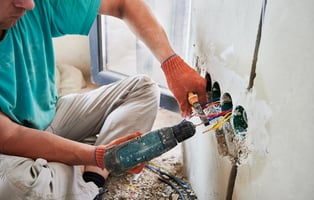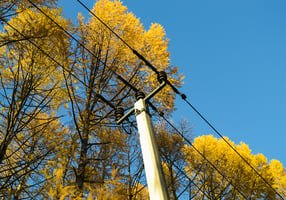The electrical wiring in your home is an unsung hero behind the scenes. It powers your lights,...
Electrical Safety for Pets: Keep Your Furry Friends Safe from Hazards
 We all cherish our pets, but their curious nature can sometimes lead them into perilous situations, particularly when it involves electrical wiring. Whether it's a kitten innocently playing with dangling cords or a puppy unknowingly teething on power cables, these behaviors can pose grave risks. Understanding why pets chew on wires and how to prevent these hazards is not just important, it's a matter of their safety and well-being.
We all cherish our pets, but their curious nature can sometimes lead them into perilous situations, particularly when it involves electrical wiring. Whether it's a kitten innocently playing with dangling cords or a puppy unknowingly teething on power cables, these behaviors can pose grave risks. Understanding why pets chew on wires and how to prevent these hazards is not just important, it's a matter of their safety and well-being.
Why Do Pets Chew on Electrical Wiring?
Pets, especially puppies and kittens, often use their noses and mouths to explore their environment. Here are a few reasons they might chew on wires:
- Teething: Young pets often chew on objects to soothe their gums as their teeth grow.
- Curiosity: Pets are naturally inquisitive and may chew on wires out of sheer curiosity or boredom.
- Playfulness: Dangling cords can look like irresistibly fun toys, which can prompt playful behaviors like swiping or biting at the loose wires.
The Dangers of Chewing on Electrical Wires
When your four-legged family members chew electrical wires, they face a handful of risks:
- Electrical Shocks: Chewing on live wires can cause severe electrical shocks, which can lead to burns, pain, and even fatal injuries.
- Internal Injuries: Swallowing wire fragments can cause internal injuries or blockages, which may require emergency veterinary care.
- Fire Hazards: Damaged wires can spark and potentially start a fire, obviously posing a danger to your pet, your family, and your home.
How to Protect Your Pets from Electrical Hazards
You adore your pets, and you want to ensure their safety. Here’s a few best practices you can implement to better protect them, as well as to keep your home safe.
- Using Cord Protectors: Place protective covers on all exposed wires to make them less accessible and less appealing to chew on. Ensure the cord protector is securely fastened and covers the entire length of the wire. This will make it harder for your pet to reach the wire and will reduce the risk of electrocution.
- Hiding Cords: To keep wires out of sight, run them behind furniture or use cord management solutions to keep them off the floor.
- Unplugging Unused Devices: Disconnect devices when they're not in use to prevent live wires from being accessible.
- Train Your Pets: Training is essential for so many reasons, not least of which is pet safety. Teach your pets commands such as "leave it" to discourage them from approaching or chewing on wires.
- Providing Chew Toys: Offer safe and appropriate chew toys to satisfy their need to chew, especially for teething puppies and kittens. Look for toys that are specifically designed for pets and are made of non-toxic materials. Avoid toys with small parts that can be easily chewed off and swallowed. This will help prevent your pet from turning to wires as an alternative way to relieve teething.
- Supervised Playtime: Keep a close eye on your pets during playtime, especially the young ones, to ensure they don't get into dangerous situations.
How a Professional Electrical Safety Assessment Can Help
Ensuring your home's electrical system is up-to-date and safe is another key step in protecting your pets. Regular electrical safety assessments can identify potential hazards and make sure all wiring is properly secured and maintained.
Contact Wilcox Electric to schedule an electrical safety assessment and make your home safer for your beloved pets, as well as for the humans who reside there. Our experts can help you identify and mitigate risks, ensuring safety for your furry friends, and peace of mind for you.




